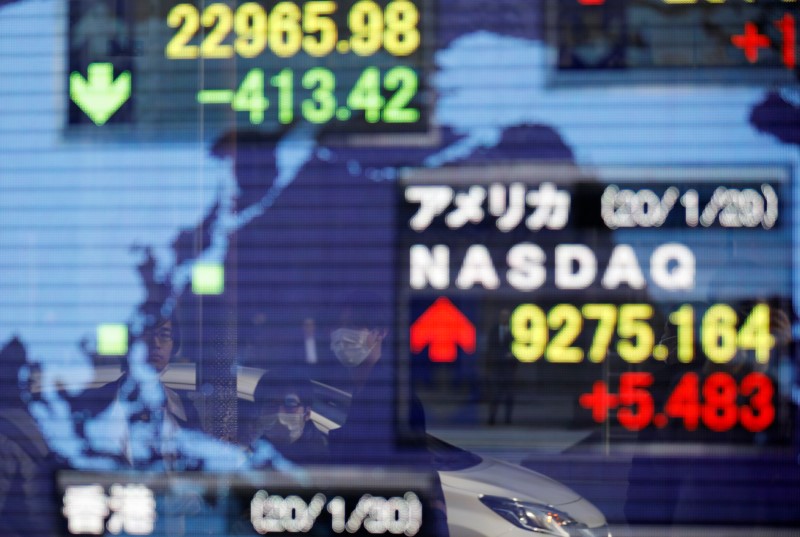By Tom Wilson and Tom Westbrook
LONDON/SINGAPORE (Reuters) - The dollar surged on Thursday as extraordinary steps by central banks across the world to cope with a coronavirus-induced financial rout had mixed success.
The dollar gained against the British pound
Against a basket of six major currencies (=USD) the dollar gained 0.6%, near a more-than-three-year high touched a day earlier.
Bond markets recovered after the European Central Bank pledged late on Wednesday to buy 750 billion euros ($820 billion) in sovereign debt through 2020. That brought the ECB's planned purchases for this year to 1.1 trillion euro, with the new purchases alone worth 6% of the euro zone's GDP.
Sovereign bond yields in Italy and across the euro zone dropped after the ECB's emergency measures, and European stocks arrested their rout.
"The announcement (the ECB) has made has gone some way to comforting markets that borrowing costs in those economies won't be allowed to spiral higher," said Mike Bell, global market strategist at J.P. Morgan Asset Management.
Europe's broad Euro STOXX 600 (STOXX) eked out a 1.2% gain in early trading, with most indexes in Frankfurt (GDAXI) up a 1.5% and Paris (FCHI) climbing 3.3%. London's FTSE (FTSE) added 0.6%.
Equities remained shaky elsewhere as the dollar rose. MSCI's broadest index of Asia-Pacific shares outside Japan slumped by 4% slump (MIAPJ0000PUS). Korea and Taiwan led the losses as the index plunged to a four-year low, with circuit breakers triggered in Seoul, Jakarta and Manila.
MSCI's world equity index (MIWD00000PUS), which tracks shares in 49 countries, was down 0.2%.
Wall Street futures were pointing to gains of 0.1%.
(Graphic: Equities and bonds total return, https://fingfx.thomsonreuters.com/gfx/mkt/13/3643/3604/Pasted%20Image.jpg)
ITALIAN YIELDS FALL
Italy, which has seen its borrowing costs jump in recent days, led the drop in yields after the ECB move. Its two-year bond yields slumped by than 100 basis points to 0.41% (IT2YT=RR), heading for its biggest one-day fall since 1996. Italy's 10-year bond yields slid as much as 90 bps to 1.40% (IT10YT=RR).
The gap over safer German Bund yields tightened almost 100 bps from Wednesday's closing levels and were set for the biggest daily drop since the 2011 euro one crisis.
Markets elsewhere failed to respond to central bank action. Before the ECB move, the U.S. Federal Reserve promised a liquidity facility for money market mutual funds and the Bank of Japan made two unscheduled bond purchases totalling 1.3 trillion yen ($12 billion). The Australian central bank slashed interest rates to a record low of 0.25%.
Traders reported huge strains in bond markets, however, as distressed funds sold any liquid asset to cover losses in stocks and redemptions from investors.
Benchmark 10-year sovereign bond yields in New Zealand, Malaysia, Korea and Singapore and Thailand surged as prices tumbled, and U.S. 10 year Treasuries (US10YT=RR) rose 10 basis points through the session.
"Not only central banks, but governments are throwing everything at the economy right now, but markets aren't responding" said Luca Paolini, chief strategist Pictet Asset Management.
Commodities fell as the virus outbreak worsened. The pandemic has killed almost 9,000 people globally, infected more than 218,000 and prompted widespread emergency lockdowns.
Gold
Oil steadied after an overnight plunge to an 18-year low in Asian trade. Brent (LCOc1) was up $2.14 to $27.02.
J.P. Morgan economists forecast the U.S. economy will shrink 14% in the next quarter and the Chinese economy will drop more than 40% on an annualised basis in the current one.
"There is no longer doubt that the longest global expansion on record will end this quarter," they said in a note. "The key outlook issue now is gauging the depth and the duration of the 2020 recession."
